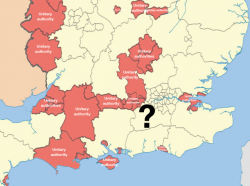 Abraham Lincoln
If given the truth, the people can be depended upon to meet any national crisis...
Abraham Lincoln
If given the truth, the people can be depended upon to meet any national crisis...
 Guildford news...
for Guildford people, brought to you by Guildford reporters - Guildford's own news service
Guildford news...
for Guildford people, brought to you by Guildford reporters - Guildford's own news service
Letter: Beware of the Call for a County Based Unitary Authority
Published on: 9 Jul, 2023
Updated on: 9 Jul, 2023
From: Bernard Quoroll
In response to: The System Is Simply Not Working
I have worked as the chief executive of a large district council within the so-called two-tier system and of two councils – a London Borough and a unitary county council.
Mr Creese is right in suggesting that unitary councils generally work better in achieving some economies of scale and in reducing confusion about accountability for services but that is not by any means the whole story.
Counties tend to be too large to connect meaningfully with local communities and in my experience are far more distant from and less sensitive to more local needs. They also pay larger salaries to more senior people than districts and are not therefore as cheap to run as they typically assert. They are certainly, in my view, much less accountable to the people they serve.
Local government took the biggest financial hit post-2008 and has continued to do so, losing a third of its resources and leading to crazy investment schemes and a raft of bankrupt councils searching for get-rich-quick schemes to balance their books. Woking, Slough, Northamptonshire, Croydon are just the tip of an iceberg. There are many more bankruptcies in waiting.
Another response has been for districts to share chief executives and management teams [as at Guildford & Waverley Borough Councils] in a lame attempt to spread the butter more thinly and reduce management costs. But that only works as a short-term measure.
Chief officers cannot do justice to the needs of their communities in two and a half days of the working week. Councils are much more than agencies for delivering bespoke services. They are supposed to be the living hearts of the communities they serve and that is not a function that should be performed part-time. Each council’s culture is unique to itself as should be its managerial and political leadership.
The solution is to build unitary councils which are typically smaller than counties but larger than most district councils today. Doing so provides a better balance between efficiency, accountability and community responsiveness. It also creates more “space” for parish councils which have a valuable role to play at the most local level. There is however no perfect structure because every place is different.
But beware, central government does not see things that way. For central governments, big is beautiful. It enables them to exert more control and reduces the number of bothersome agencies it needs to deal with.
In places like Surrey, it provides an opportunity to consolidate political control and is, in my view, deeply unhealthy if you believe in local democracy. It can even amount to gerrymandering.
Responses to Letter: Beware of the Call for a County Based Unitary Authority
Leave a Comment Cancel reply
Please see our comments policy. All comments are moderated and may take time to appear. Full names, or at least initial and surname, must be given.
Click on cartoon for Dragon story: Public Asked for Views on SCC’s Proposal for Reduced Speed Limits






Recent Articles
- Work to Repair Cottage on Closed A281 Underway
- Letter: Not All PIP Claimants Need It
- AI Technology at the Forefront of Surrey Conservation Project
- Mayor of Guildford Drops In on One of His Chosen Charities
- The Church’s Message Is As Relevant As Ever, Says Ash’s Retiring Priest
- CANCELLED: Have a Blooming Picnic – June 7
- Eight Out of Ten PIP Claimants in Guildford Face Cuts to Their “Lifeline”
- Waverley’s New Discretionary CIL Review Scheme To Be Revealed Soon
- Council Accepts Responsibility of Meeting Farnham Museum’s Ballooning Repair Costs
- Notice: Cut It Out!


Recent Comments
- Andrew Eacott on SCC Intends to Back Public Survey Result and Shorten Summer School Holidays
- Sally Astles on Stoke Park Was Bought 100 Years Ago with Plans for a Public Open Space and Houses!
- I Macpherson on Work to Repair Cottage on Closed A281 Underway
- Judith Simmons on A Look Back at Perry Hill’s New Inn and a Family That Once Ran It
- Bernard Quoroll on Community Councils Proposed to Maintain Local Representation
- John Lomas on A Look Back at Perry Hill’s New Inn and a Family That Once Ran It
Search in Site
Media Gallery
Dragon Interview: Local Artist Leaves Her Mark At One of England’s Most Historic Buildings
January 21, 2023 / No Comment / Read MoreDragon Interview: Lib Dem Planning Chair: ‘Current Policy Doesn’t Work for Local People’
January 19, 2023 / No Comment / Read MoreA3 Tunnel in Guildford ‘Necessary’ for New Homes, Says Guildford’s MP
January 10, 2023 / No Comment / Read More‘Madness’ for London Road Scheme to Go Ahead Against ‘Huge Opposition’, Says SCC Leader
January 6, 2023 / No Comment / Read MoreCouncillor’s Son Starts Campaign for More Consultation on North Street Plan
December 30, 2022 / No Comment / Read MoreCounty Council Climbs Down Over London Road Works – Further ‘Engagement’ Period Announced
December 14, 2022 / No Comment / Read MoreDragon Interview: GBC Reaction to the Government’s Expected Decision to Relax Housing Targets
December 7, 2022 / No Comment / Read MoreHow Can Our Town Centre Businesses Recover? Watch the Shop Front Debate
May 18, 2020 / No Comment / Read More







H Trevor Jones
July 9, 2023 at 3:26 pm
I have just read both Bernard Quoroll’s and Brian Crease’s comments and I share Brian’s interest in public transport which, as I’ve argued before, needs to be organised at a level higher than local boroughs or unitary authorities because of the cross-border travel, e.g. in the 2021 SCC elections when unitaries were in the discussions – I’ve just checked my old emails.
We don’t want one unitary subsidising a bus to the border in the middle of nowhere if the next authority doesn’t support the onwards journey. I don’t have strong views on other things like education, libraries, rubbish collection, where maybe unitaries would work best.
But if we could make Transport for SE England (TfSE) a statutory body for transport, with local accountability via representatives from elected bodies, then maybe that would satisfy me. I suspect that cross-border issues between adjacent regional bodies would be less critical than between adjacent unitary bodies.